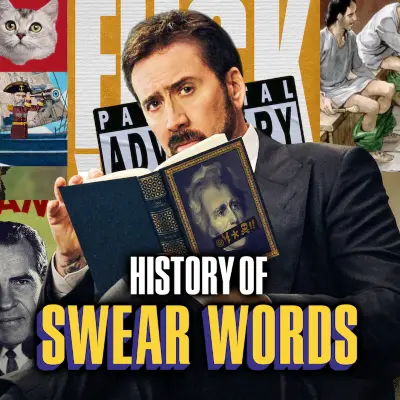Netflix’s History of Swear Words is surprisingly deep -- it's much more than "Nicolas Cage swearing ASMR"
-

"The elevator pitch for Netflix’s History of Swear Words is an immediately appealing one: Nicolas Cage, cinema’s patron saint of lunacy, walks viewers through the history behind a specific curse word, and curses copiously in the process," says Karen Han. "In other words, it’s Nicolas Cage swearing ASMR. That log line alone would be enough to get viewers (or at least me) to tune in, but Cage is ultimately just the bait for the series, which, over the course of six 20-minute episodes, goes surprisingly deep into not only each epithet’s origins but the effects of racism and misogyny on what is or isn’t considered taboo, and what can or can’t be reclaimed. If anything, the only pity is that the series isn’t longer; the discussions are fascinating and unusually upfront, and beg a more detailed history than the brief overview can provide."
ALSO:
- Too bad History of Swear Words isn’t half as colorful as the language it explores: "Which raises the question: WTF, Netflix? How’d you, er, fudge up this one?" says Lorraine Ali. "The platform’s easiest trash-TV sell since Tiger King is an unimaginative snooze, a bland serving of salty language, an insult to creative cursers everywhere. These profanities — embraced by truck drivers and sailors, captured on hot mics near politicians and preachers, murmured by harried moms and parroted by their toddlers at the worst possible moment — deserve better. The series is a clumsy parody from the outset: Sitting by a fire in an armchair like a Masterpiece Theatre presenter, Cage hams up the highbrow delivery, setting up the expectation that when he starts dropping F-bombs, it’ll be a laugh riot. Just plain funny would be acceptable too. But it’s not. Predictable as [fill in your favorite expletive here]."
- What about George Carlin?: "I can accept that certain words were excluded so that there would be things to talk about in a second season and that the writers didn't always want to steer toward the most obvious stories and connections," says Daniel Fienberg. "But I'm a bit incredulous that a show with this title could go six episodes without anybody mentioning George Carlin. Certainly the comics should have made sure that Carlin, Lenny Bruce and Richard Pryor were acknowledged properly. They're not. The comics are, honestly, a real letdown. There are raunchy chuckles from the likes of Nikki Glaser, London Hughes and Baron Vaughn, but mostly disposable giggly laughs."
- History of Swear Words doesn't overuse Nicolas Cage: "In theory, 'Nicolas Cage hosts a Netflix show about swear words' sounds like a wacky game show the algorithm spat out as an afterthought," says Caroline Framke. "In practice, The History of Swear Words is more educational and straightforward than that, delivering six bite-sized lessons on six verboten and/or controversial words with the help of etymologists, comedians and historians. Cage, who’s made a sport of revving up his inherent intensity to absurdist new heights, proves a smart choice for a host. This is both because he’s an enigmatic actor who’s game for anything, and because the show doesn’t overplay its hand with him, keeping his contributions brief enough that you don’t leave an episode going, 'alright, we get it, Nicolas Cage is a weirdo who likes to curse.'"
- History of Swear Words offers some genuinely interesting information, even if it's supposed to be lighthearted: "It’s mostly an educational lark that enables comedians to riff on obscenities and allows Nicolas Cage — I know, I know, I buried the lede — to act as an overly serious, Masterpiece-style host of the proceedings who tears into his dialogue like a bread-maker attacking a rare steak," says Jen Chaney, adding: "Cage, an actor known for barring no holds and blasting through Do Not Enter signs, does exactly what you’d hope for as the host of a show like this. At one point, with all the seriousness of a pallbearer, he declares, 'Sh*t is the great equalizer.'”
- History of Swear Words should've been longer with more context and a little tension: "History of Swear Words crams in a lot into each episode, from Terry Gilliam-style animation to quick, hit-and-run film clips of famous movie swearing (Clark Gable’s final line in Gone with the Wind, for starters)," says Michael Phillips. "We learn that the word 'darn' first appeared in a 1781 edition of The Pennsylvania Magazine, a so-called 'minced oath' substitute for 'damn.' What’s missing here overall isn’t seriousness, but context and a little tension. The way the comics are deployed individually, too many of the same points are stated, reiterated and unchallenged. (A roundtable setup would’ve been livelier.) An extra 10 minutes per episode might’ve led to a richer examination of the issues — the words humankind creates, then stigmatizes, then weaponizes, and then tends to use over and over to less effective advantage."
TOPICS: History of Swear Words, Netflix, Nicolas Cage, Documentaries
